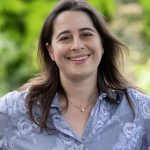I can’t remember a time when I didn’t love to write. At my eighth-grade graduation, my English teacher gave me a book of Emily Dickinson’s poetry, which I pored over, almost liturgically, during my formative years. The poem that has always stuck with me is a poem that begins: “I dwell in possibility/ a fairer house than prose/ more numerous of windows/ superior for doors. Of gambrels as the cedars/ impregnable of eye/ and for an everlasting roof/ the gambrels of the sky.”
My approach to the writing process has always been one that honors the mode of thinking Dickinson references here: one steeped in possibility, as it embraces the playful expansiveness, limitless capacity, and circuitous, shape-shifting nature of the way thought becomes art. As a student at Carleton College; a graduate student at Penn and Harvard; and a humanities and religion teacher at Phillips Exeter Academy and St. Paul’s School, I continuously kept the notion of possibility at the forefront of my mind, as I curated, both as a teacher and as a writer, various approaches to constructing beautiful, meaningful, and powerful narratives.
In my work with my company, Words We Live By, I aim to teach students how to share their stories from a place of confidence, reverence, and joy, as they learn how to (re)connect with their higher senses of Self; their present communities; their ancestors; and the beautiful earth that formed them. This vision for reimagining the teaching of narrative in the context of contemporary contemplative studies still has its roots, fundamentally, in that one word: possibility. I am very excited to bring this approach to narrative construction to my work with students at College Bound Mentor. Are you ready to contemplate and write the narratives that reveal your truth? The possibilities are endless; I can’t wait to explore them with you.



